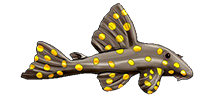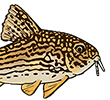My name is Phil. I am a new member, just de-lurking.
I was in my LFS today, and they have some Polkadots/Snowballs, they believed to be Baryancistrus.
They arent exactly certain however.
Does anyone have a fairly reliable method of telling these species apart?
I would particularly like to be clear on adult size, and water parameters prior to purchase.
For what it is worth, they were about 2-3 inches in length, so juvenile. They had a few large white spots on a very black body.
Any assistance would be gratefully recieved.
Phil.
PS are polkadots and snowballs interchangable when talking about these fish?





